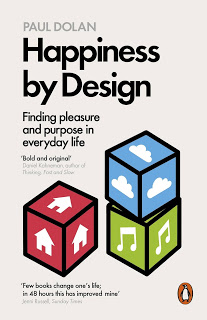
I decided that in 2019 I would for the first time in my life start reading self-help. Let’s not go into why, as this is allegedly not a confessional blog. Now this is not my first self-help book of the year, but I can’t immediately find the the other one, so here we go.
Stammering less has helped, of course, but paying less attention to it matters much more. What applies to my stammer applies to all the possible causes of your happiness and to all that you might do to be happier. Your happiness is determined by how you allocate your attention. What you attend to drives your behaviour and it determines your happiness. Attention is the glue that holds your life together. . . The scarcity of attentional resources means that you must consider how you can make and facilitate better decisions about what to pay attention to and in what ways. If you are not as happy as you could be, then you must be misallocating our attention.
You can trust your own experiences more than your desires. You might think that being the next Lady Gaga will make you happy and attempt to achieve it but then find that all your experiences along the way are miserable ones. It’s uncertain what your experiences of fame would be like if you were to attain it and so if you aren’t experiencing pleasure and purpose along the way, you are giving up happiness now that might not lead to more happiness later. Keep your eye on the happiness prize by tuning into the feedback from your experiences. You can also trust your own experiences more than your projections. Whatever you choose to do, you will only ever experience your choices, not the other options involved in the decisions, and so you won’t spend anywhere near as much time thinking about what might have been as you think you will.
I followed his advice about keeping a diary for a couple of days that just lists your activities on those days and score from 1-10 how pleasant or purposeful they were (i.e., how happy they made you). It was indeed quite illuminating. I have also found this focus on attention to be quite helpful for example when in a queue; the idea that I can choose whether or not to focus on the irritating queue (rather than my podcast for example) is quite liberating. In general though, he argues:
We don’t really allocation unconscious attention in any meaningful way – it just gets allocated without us having to make any real decision about what is attended to. But, as we shall see, you can consciously select the environments that your unconscious attention can roam in. Although you can’t consciously dictate how your dug runs around a field, you can choose which park you take it to. We are a lot like dogs in how we react to situational triggers.
So he also gives other advice about how to prompt yourself to be happier without relying too much on your intellect or your willpower. (e.g., setting up defaults for your behaviour; norms of people around you; etc). I’ll end with a fun /chilling story he told. There is this fisherman with a very relaxed life. A business man asks him why he doesn’t expand his business. What for? asks the fisherman. So you can hire more people, says the businessman. What for? asks the fisherman. So you can be rich, says the businessman. What for? he asks again. And the reply, as you’ve probably already guessed is: so you can retire and fish and be relaxed.
